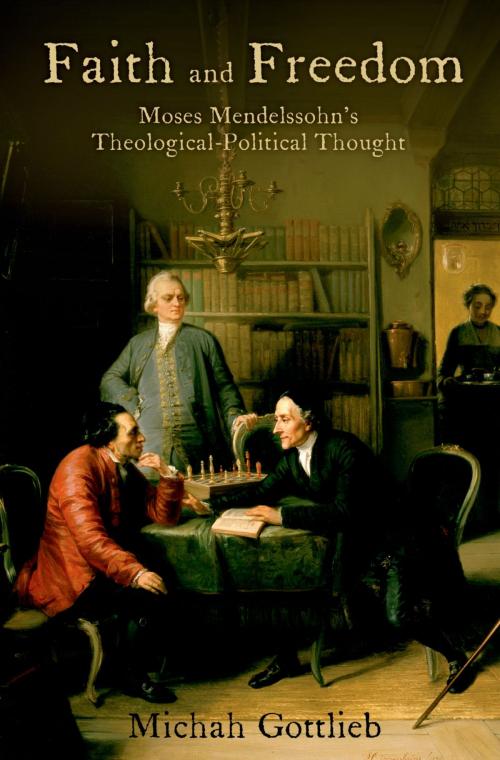Faith and Freedom
Moses Mendelssohn's Theological-Political Thought
Nonfiction, Religion & Spirituality, Judaism| Author: | Michah Gottlieb | ISBN: | 9780190453336 |
| Publisher: | Oxford University Press | Publication: | March 2, 2011 |
| Imprint: | Oxford University Press | Language: | English |
| Author: | Michah Gottlieb |
| ISBN: | 9780190453336 |
| Publisher: | Oxford University Press |
| Publication: | March 2, 2011 |
| Imprint: | Oxford University Press |
| Language: | English |
The recent renewal of the faith-reason debate has focused attention on earlier episodes in its history. One of its memorable highlights occurred during the Enlightenment, with the outbreak of the "Pantheism Controversy" between the eighteenth century Jewish philosopher Moses Mendelssohn and the Christian Counter-Enlightenment thinker Friedrich Heinrich Jacobi. While Mendelssohn argued that reason confirmed belief in a providential God and in an immortal soul, Jacobi claimed that its consistent application led ineluctably to atheism and fatalism. At present, there are two leading interpretations of Moses Mendelssohn's thought. One casts him as a Jewish traditionalist who draws on German philosophy to support his premodern Jewish beliefs, while the other portrays him as a secret Deist who seeks to encourage his fellow Jews to integrate into German society and so disingenuously defends Judaism to avoid arousing their opposition. By exploring the Pantheism Controversy and Mendelssohn's relation to his two greatest Jewish philosophical predecessors, the medieval Rabbi Moses Maimonides and the seventeenth century heretic Baruch Spinoza, Michah Gottlieb presents a new reading of Mendelssohn arguing that he defends Jewish religious concepts sincerely, but gives them a humanistic interpretation appropriate to life in a free, diverse modern society. Gottlieb argues that the faith-reason debate is best understood not primarily as an argument about metaphysical questions, such as whether or not God exists, but rather as a contest between two competing conceptions of human dignity and freedom. Mendelssohn, Gottlieb contends, gives expression to a humanistic religious perspective worthy of renewed consideration today.
The recent renewal of the faith-reason debate has focused attention on earlier episodes in its history. One of its memorable highlights occurred during the Enlightenment, with the outbreak of the "Pantheism Controversy" between the eighteenth century Jewish philosopher Moses Mendelssohn and the Christian Counter-Enlightenment thinker Friedrich Heinrich Jacobi. While Mendelssohn argued that reason confirmed belief in a providential God and in an immortal soul, Jacobi claimed that its consistent application led ineluctably to atheism and fatalism. At present, there are two leading interpretations of Moses Mendelssohn's thought. One casts him as a Jewish traditionalist who draws on German philosophy to support his premodern Jewish beliefs, while the other portrays him as a secret Deist who seeks to encourage his fellow Jews to integrate into German society and so disingenuously defends Judaism to avoid arousing their opposition. By exploring the Pantheism Controversy and Mendelssohn's relation to his two greatest Jewish philosophical predecessors, the medieval Rabbi Moses Maimonides and the seventeenth century heretic Baruch Spinoza, Michah Gottlieb presents a new reading of Mendelssohn arguing that he defends Jewish religious concepts sincerely, but gives them a humanistic interpretation appropriate to life in a free, diverse modern society. Gottlieb argues that the faith-reason debate is best understood not primarily as an argument about metaphysical questions, such as whether or not God exists, but rather as a contest between two competing conceptions of human dignity and freedom. Mendelssohn, Gottlieb contends, gives expression to a humanistic religious perspective worthy of renewed consideration today.















